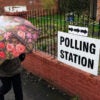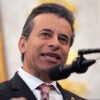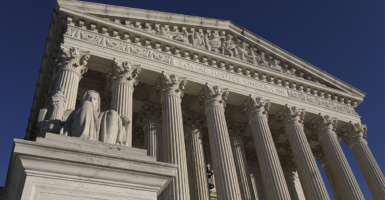The U.S. Supreme Court is nearing the end of its 2022-2023 term with a number of controversial cases awaiting decisions, including ones dealing with affirmative action, student loans, free speech, and immigration.
The cases include Students for Fair Admissions v. President and Fellows of Harvard College and Students for Fair Admissions v. University of North Carolina, which relate to affirmative action; Biden v. Nebraska and Department of Education v. Brown, which relate to student loan forgiveness; and 303 Creative v. Elenis, which relates to free speech.
GianCarlo Canaparo, a senior legal fellow at The Heritage Foundation, joins today’s episode of “The Daily Signal Podcast” to discuss some of the cases in more detail, some likely outcomes for the cases, and the podcast that he co-hosts, “SCOTUS 101.” (The Daily Signal is the news outlet of The Heritage Foundation.)
Listen to the podcast below or read the lightly edited transcript.
Samantha Aschieris: Joining today’s episode of “The Daily Signal Podcast” is GianCarlo Canaparo, a senior legal fellow here at The Heritage Foundation. GianCarlo also co-hosts The Heritage Foundation’s “SCOTUS 101” podcast, which comes out every Friday when the court is in session. Thanks for joining us today.
GianCarlo Canaparo: Thanks for having me.
Aschieris: So, there are a number of cases that we are still waiting on decisions for relating to immigration, affirmative action, student loans, among others, and I want to highlight some of those cases for audience members today. And I want to start with the student loan forgiveness cases.
So we have Biden v. Nebraska and then Department of Education v. Brown, and those arguments were held back on Feb. 28. Can you walk us through the cases, what was argued on both sides back in February?
Canaparo: Yeah, sure. So, of course, as everyone knows, President [Joe] Biden purported to find authorization in an old emergency statute that came out of 9/11, the terrorist attacks of 9/11, that allowed the president’s secretary of education to, and the language is, waive or modify certain provisions of the laws governing federal student loans in times of crisis.
And the act was geared toward military members deployed overseas and it has been used in the past on a temporary basis to give temporary relief to deployed service members after 9/11. But Biden said that “with the COVID-19 pandemic and my emergency declaration, I can forgive student loans for everybody permanently.”
This was a novel and pretty tendentious reading of this particular emergency statute. Anybody who’s fairly serious admits that much. In fact, even Biden himself until he actually did it, said, “I really don’t think I have the power to do this.” [Former House Speaker] Nancy Pelosi said, “There’s no way you have the power to do this.” But he did it anyway, and lo and behold, here we are.
The real issue is not whether it’s legal, if the court gets to that question, for sure it will strike it down as an abuse of executive power. The problem here is finding somebody who has what’s called standing to sue, somebody who has suffered an injury.
Now, if you’re a taxpayer and you’re very mad that the government is wasting your money to give handouts to a favored voting group, unfortunately, under Supreme Court case law, that doesn’t mean you get to sue. Somebody has to have suffered some sort of real concrete injury that flows from this.
So, a bunch of states have sued, they’re the lead plaintiffs in this particular case, and they have said, “We, in our states, have state agencies that service these loans.”
So the federal government sends you the money, lends you the money, and these servicers manage all the backend paperwork and they get a fee based on how many loans they service. So, when the government comes along and cancels these loans, they lose out millions of loans and therefore all the money that comes from them. So they’re suing.
Now, whether or not that meets the legal standards for standing is an open question. I think they do, there are not implausible arguments that they don’t. So if the court ends up siding with Biden, it will almost certainly do it on this standing issue. It’ll say nobody who sued actually has standing to sue, the effect of which will allow Biden to do this.
Aschieris: When do you think we’ll likely get a decision on this case?
Canaparo: Well, there are three weeks left in the term. So I can say with absolute certainty that in the next three weeks there’s a 33% chance that we get one.
Aschieris: OK, OK. I also wanted to ask, just based on what you’re hearing, what you’ve been seeing, what do you think likely that the outcome will be?
Canaparo: I think my sense is that the court will probably find that at least one of the states has standing. You only need one. And from there, moving onto the merits, did Biden or did he not abuse this emergency statute? That’s not a hard question, he did. So, as long as we can get past standing, I am very confident that the Supreme Court will strike it down.
Aschieris: And in other education-related cases, we also have two cases relating to affirmative action—Students for Fair Admissions v. President and Fellows of Harvard College and then Students for Fair Admissions v. University of North Carolina. Those arguments were held back in October. Same thing as before, can you walk us through the arguments here? What are these cases all about?
Canaparo: Sure. So, let me take you back in time a little ways.
There’s a Supreme Court opinion called Bakke, where the court split on using racial preferences in university admissions. But one justice, Justice [Lewis] Powell, said, “Well, I think that race should be a factor toward considering what he called genuine diversity,” which is diversity of thought and diversity of experience and diversity of philosophy. And he said, “Race is part of that.”
And so you should be able to use race in a holistic way in your admissions process, but you can’t use quotas. Later on, a majority of the Supreme Court would adopt that approach and say, “You can’t use quotas, but you can consider race.”
What universities have been doing is essentially quotas by other names and otherwise using race as all of diversity rather than just part of it.
So, for instance, in Harvard’s case, there’s evidence that came out that showed that Harvard wanted to racially balance its student body. They found that because Asians tended to have very high test scores and good extracurriculars and great academics, they were getting in at a rate higher than their percentage of the population, what someone at Harvard would call overrepresentation.
Harvard didn’t like that, Harvard wanted only a very particular portion of Asians. So what they did is they granted personality scores to applicants and they systematically reduced the personality scores on all Asians so that they could reduce the number.
The University of North Carolina did something similar. And they were really balancing and discriminating against certain minorities in favor of others because, again, universities are a zero-sum game, there are only certain number of spots. So discriminating in favor of one person is discriminating against somebody else.
And there is a law, Civil Rights Act, that says, “No discrimination on the basis of race,” it’s not allowed. The Supreme Court in the past said, “Well, we’re going to make an exception for diversity.” Diversity writ large, genuine diversity in the words of Justice Powell. And the University said racial diversity.
So the question is, can they keep doing this? It’s pretty clear as a matter of the text of that statute that they can’t, but the way the Supreme Court has interpreted it is to give them that exception, so the Supreme Court is going to revisit that.
My sense and hope is that they say, like Chief Justice [John] Roberts stated in another race case some years ago, that the way to stop discrimination on the basis of race is to just stop discriminating on the basis of race, which is what the universities are doing.
Aschieris: So it seems likely that the Supreme Court will rule in favor of Students for Fair Admissions, do you think?
Canaparo: That’s my sense. You never know. Somebody like the chief justice, I mean, just a few days ago he handed down a decision that said not only can states racially balance congressional districts, they must racially balance congressional districts. That was a surprise. We didn’t think that the chief justice, “Mr. No Discrimination on the Basis of Race” would come along and say, “You must discriminate on the basis of race,” but he did.
So after that decision came down last week, I’m slightly less hopeful, but I think that it’s still more likely than not that they’ll say race-based discrimination in university admissions is not permissible.
Aschieris: And then, finally, just one more case that I wanted to highlight is 303 Creative v. Elenis, which was argued back in December. Again, could you just walk us through what’s being argued here?
Canaparo: Yeah, absolutely. So you might remember last year a case called Masterpiece Cakeshop, and the claim there was that a man who’s a master baker didn’t want to produce a wedding cake to celebrate a same-sex marriage. And his claim there sounded in religious liberty, he said, “I have a religious freedom right here.” This 303 Creative is similar.
The artist here produces custom websites and doesn’t want to produce one that celebrates a same-sex marriage. Her claim, though, is not in religious liberty, it’s in free speech. And she says, “You can’t compel me to celebrate your wedding, which is essentially what you’re forcing me to do by using my skills and my speech to create a website.” That’s the argument.
Now, on the other side, the couple at issue here says, “We have a right not to be discriminated against in the provision of goods and services.”
So really the claim boils down to, is this sort of a generic good or service for which you can’t discriminate? Like Walgreens couldn’t discriminate in who gets to buy toothpaste, for instance, right? Because there’s no speech involved, you’re making yourself available to the general public and you have to do that on equal basis.
And so, the couple here says, “Well, this is really just a generic product, it’s just a generic website.” And the creator of the website says, “Well, no, it’s a custom-made product. Everyone is unique. Everyone involves me speaking. I’m writing things for you. I am creating a design that celebrates you. It’s a unique product. Anyone can design a website, just like anyone can paint a picture, but nobody can paint a Picasso, or whoever else. It’s a unique product.”
So it’s speech. So that’s really what the case is going to boil down to. If it’s truly a unique product, she will have a free speech right in it. If it’s just a generic product, she will not.
Aschieris: So, Lorie Smith is the owner of 303 Creative. I wanted to also, just for her case specifically, do you think we’ll see more cases like hers moving down the line in the future?
Canaparo: Oh yeah, for sure. I mean, one of the things that we’ve seen about what we’ll call gender and sex activists is that they’re not content to leave people alone who disagree with them.
I mean, the people in this case, they didn’t need to go to Lorie Smith to design a website, they went to Lorie Smith because they wanted to sue Lorie Smith, and they knew what answer they were going to get from her, and that was the whole point of this.
So yeah, we’re going to see a lot more cases like this going forward, and you’re going to have like in the Masterpiece Cakeshop case that we didn’t actually get a decision on the merits there because the state bureaucracy in Colorado was so unbelievably hostile to the cake maker there that it was a really easy religion discrimination case. So we didn’t even have to get to the underlying merits of the tension between religious liberty and anti-discrimination laws.
But yeah, we’re going to see a lot more cases like these, people with conscience objections to the sex and gender movement have targets on their back.
Aschieris: Now, as I mentioned at the top of the show, there are many other cases that we still don’t have decisions for. What other ones do you think are noteworthy, worth highlighting for our audience?
Canaparo: Sure. There’s a case between Biden and the state of Texas about whether or not Biden can sort of unilaterally suspend or change the immigration laws, but Texas of course says “no.”
We have another one called Haaland v. Brackeen, which involves a law called the Indian Child Welfare Act—this is another race case—that act makes major preferences for Indian children to be adopted by Indian families to such an extent, in fact, that it will often take Indian children out of loving homes from adopted or foster parents who are not Indian and put them into pretty terrible homes just because of their race.
So, some parents of an adopted Indian child are suing, saying that, “This is our child now and you can’t just take our child away from us to put it in a stranger’s home just because of his race.”
So that one we’re looking forward to.
We also have Groff v. DeJoy. This is a case that involves religious accommodations. You had a post worker, United States Postal Service, who said, “As a Christian, I would like to not work on Sunday. I’m happy to take any other sort of makeup work, I’ll work Saturdays, I’ll work night shifts and whatnot, but I have to obey the Sabbath.” And the post office said, “This is inconvenient for us, so you don’t get that.”
And under existing Supreme Court precedent, all an employer has to show is mere inconvenience, what’s called the de minimis harm, and they win. And he says, “Well, that’s not compatible with my religious freedom rights, my religious practice, so you have to make reasonable accommodations for me just like you would for somebody who’s disabled.”
So there’s that one.
And then finally, I’ll mention Moore v. Harper, this case is in an interesting position. What’s the issue here is whether or not a state supreme court can change the rules around voting in a state when the Constitution seems to give those rules purely to the state legislature’s power.
Now, the case is an interesting position, I said, because it might be moot, what’s called no longer a live dispute, because North Carolina’s Legislature has since changed the law that originally gave rise to this dispute. So whether the Supreme Court weighs in now, it may just say, “No, there’s no longer a live dispute here, so it’s dismissed,” but we’ll find out.
Aschieris: Very interesting. It’s going to be a busy couple of weeks as the Supreme Court ends its term. I just wanted to give you a chance to talk a little bit about “SCOTUS 101.” You co-host it with Zack Smith, who’s also here at The Heritage Foundation. I know you guys have an episode coming out on Friday. So what can we expect, what’s in-store for that episode?
Canaparo: Sure. So, the podcast follows the Supreme Court. Every Friday that the Supreme Court is in session, we have an episode. We will unpack all of the opinions that come out that week, any orders and other developments in Supreme Court news. We also feature interviews with advocates, judges, and professors, and we do finish every episode with Supreme Court trivia.
Aschieris: Nice. Awesome. Well, thank you so much for joining us today. I really appreciate it. And make sure everyone who’s listening subscribes to “SCOTUS 101” so you don’t miss Friday’s episode. Thank you.
Canaparo: My pleasure.
Have an opinion about this article? To sound off, please email [email protected] and we’ll consider publishing your edited remarks in our regular “We Hear You” feature. Remember to include the url or headline of the article plus your name and town and/or state.































